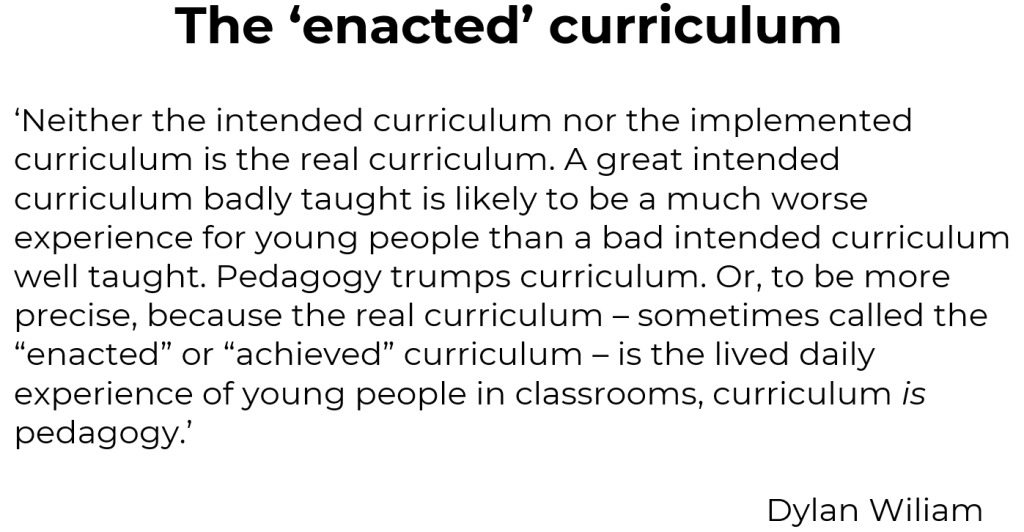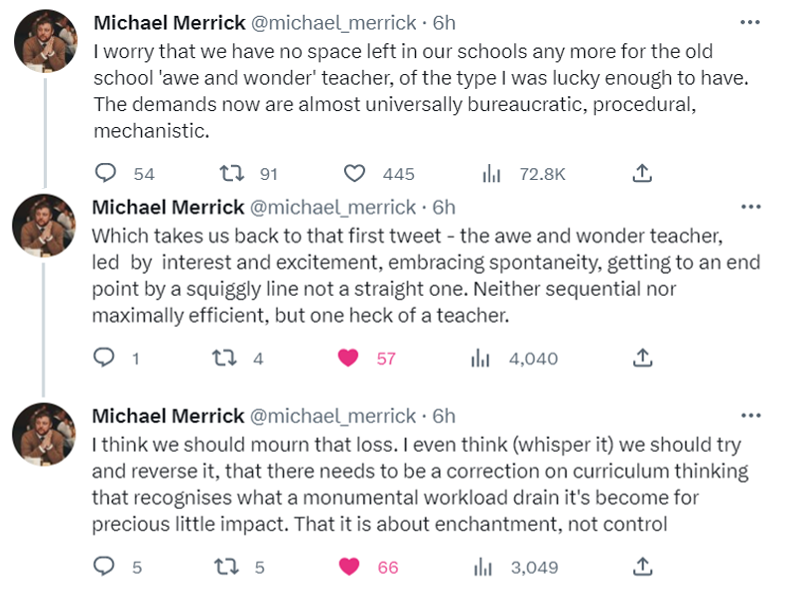Earlier this year I catalogued the many insights gleaned from educational experts which have been most influential in my curriculum thinking, in a post entitled, This much I know about… the principles of curriculum planning in action. In a series of short essays I am exemplifying in more detail ten of those influential insights, and explaining why I think they are so important to progressing pupils’ learning. This post explores Dylan Wiliam's insight that it is the enacted curriculum that matters most.
If curriculum development concerns the complex, dynamic interplay between content, adaptive teaching and assessment, which of the three is most important? This quotation from Dylan Wiliam's Principled Curriculum Design is helpful.

The logic of Wiliam's argument is so crunchingly obvious, it hurts. I suggest we have spent so much time over the past few years determining the content we want pupils to learn, that we have forgotten about how to teach in a way that makes that content - as Mary Myatt says - irresistible. And by that, I don't mean shiny gimmicks to keep pupils interested; rather, I mean making the content irresistible for its own sake.
Enacting the curriculum in a way that engages all pupils, all the time, takes enthusiasm for, and a never-ending desire to learn about, what you are teaching. It also requires teachers to practise deliberately the fundamentals of good pedagogy, never assuming they have got this complex, frustrating thing called teaching nailed. Finally, it means taking care to ensure that the content you are teaching is represented using high quality resources, not a quickly photocopied, inaccurate, downloaded worksheet.
The other implication of the challenge to make teaching irresistible, is to allow teachers to bring their love of the subject, and of teaching, to the classroom. I think there is a grain of sense in this thread from Michael Merrick which we should recognise as important.

Michael is not advocating some Dead Poets Society nonsense, but, as Christine Counsel says, the liberty for you “as a teacher to go off-piste with your passion."

We all have a professional obligation to improve our practice. That said, learning more about what you are teaching, sharpening the precision of your teaching, and developing great resources for your teaching, takes time. A good school will afford you that time. If you are working on making the enactment of the curriculum as good as it can possibly be, I'm not sure there is an opportunity cost which is more important.
The piece of advice which most impacted the way I led a school comes from Tom Bentley (not Bennett, Bentley). Over two decades ago, I heard him speak at the NCSL in Nottingham. He said, "Once you have found your core purpose, change your school’s existing structures to accommodate your core purpose rather than accommodate your core purpose around your existing structures."
Ultimately, it is the enacted curriculum that truly matters. The development of teaching and learning is a school's single most important function, its core purpose. Consequently, school leaders can do nothing more important than to find the hours during the school week for their colleagues to work on their teaching.

On 14 December, Mary Myatt, Tom Sherrington and I will be in London, talking about what we have learnt over the years about the curriculum. The event is called: Curriculum Masterclasses: A Christmas Celebration! It is only £30 (to cover costs) and John Catt Education have thrown in a free book of your choice from the range of books the three of us have published. You can book a ticket here. Come and join us!

